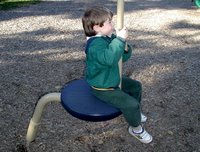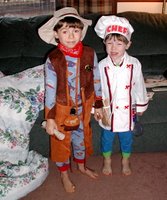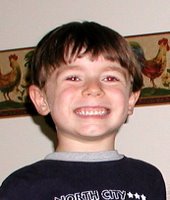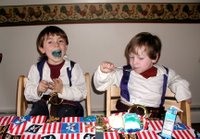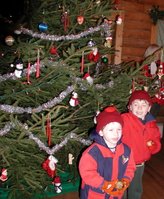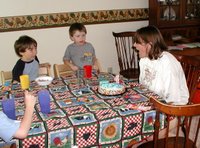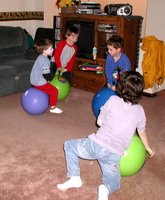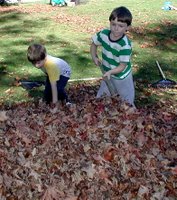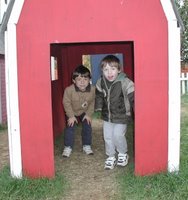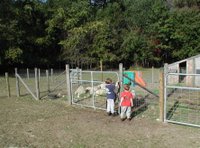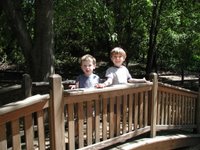electronics -- to view, or not to view
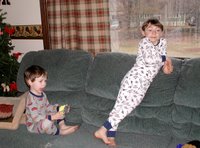 That is the question.
That is the question.And the answer's not simple. Well, I suppose if you're the "no TV" type of parents, it's a simple answer -- you just don't own a TV, and voila, no problem. However, I happen to like TV. I don't watch a lot of it, but I do enjoy a couple of shows (like, um, LOST!), and football is just NOT an option for me, it's what I live and breath for this time of year (GO PATRIOTS!). I used to be an absolute baseball nut, but the Redsox 1986 season did me in on that sport. I've not been able to shake the football fever though, nor do I have any desire to. I also love (LOVE!) watching movies on video/DVD. LOVE it, I tell you. Don't do it often, but when I do, well, I LOVE it.
So it just seems a little bit of a stretch to convince me that my kids shouldn't watch and enjoy TV too. Mind you, I can't stand child-directed advertising, so we never actually watch TV per se (as in, we don't turn on TV stations to watch -- in fact, we only get 2 stations, and not very well -- we don't have cable). But we've got a pretty extensive collection of kid videos and movies on video and DVD. And above, you can see a photo from about 10 minutes ago, of my two boys enjoying a DVD movie they got for Christmas ("Ice Age: The Meltdown").
RDI says no electronic media if it causes obsession problems. That was certainly the case for us with Video Games -- we had to sell our PS2 system when we started RDI, because it was obvious that Jacob was having problems with it -- he'd play the same game over and over for hours, often SCREAMING while he was doing it. Wasn't too much of a stretch for us to chuck it out. And we never did let him get involved with the computer beyond simply typing on the word processor. Even today, a half an hour of watching even someone else play video games while visiting will throw him into dysregulation. Truly, video games are poison for Jacob.
But to toss out the videos -- that was a whole 'nother ball of wax. True, initially Jacob seemed a bit too involved with them, in that he wouldn't come away from the screen if we asked him to. But that seemed to be an RDI stage problem -- once we'd mastered Stage 1, he was readily coming away from the screen to do other activities with me. So we determined that watching videos was NOT an obsession for him. In fact, he didn't ask to watch TV very often, it was more a family thing (we'd all sit down and watch the TV together), or a keep-the-kids-occupied-for-half-an-hour thing if I needed to get something done that they couldn't be involved in.
One argument to be made against videos was that Jacob was scripting from them excessively -- memorizing lines and repeating them constantly. But it wasn't just TV he was doing that with -- it was books and converastions he heard as well. My solution to that was to amass as large a collection as we could of both kid videos/movies and books, so that at least it wasn't the same lines over and over, and so that we weren't repeating media with him very often (with the number of videos we have, there's no need to watch the same thing twice in a 3 or 4 month span). That worked pretty well to keep my sanity at a usable level.
The situation becomes a little more complicated when you add the Enki Education view into it. Their claim (and it's backed by studies, and just plain makes sense to me!) is that watching TV causes damage to the Vestibular and Proprioceptive systems, by providing lots of visual input without any vestibular or proprioceptive input. Am I damaging my children by letting them watch TV? Enki says no to TV, except on very sparing occassions for an educational nature program. My thoughts are a little more moderate -- yes to TV, but in small, infrequent doses.
Most days we don't have any time to watch TV anyway. But on the days that we're home for large chunks of time, Zoo Boy will occassionally ask to watch something. Jacob almost never does. I think Zoo Boy is being prompted by the TV being right in the living room where they are playing, so I'm in the process of moving the TV out of our main living spaces. (As soon as football season is over, that is. Just another month!) I have a feeling that removing the TV alone is going to cut their viewing time down to just about nothing. We do, as a family, watch a couple of Spongebob Squarepants episodes in bed as part of our family time at night. Honestly, I'd prefer that we didn't (not that I don't adore Spongebob -- I do! -- I just think that TV before bed isn't the greatest of ideas). But it's such a part of our bedtime ritual now, and my kids don't have any sleep problems, that I am hesitant to change anything up right now. And since some days it's the only screen time my kids get, I'm letting it slide for now.
So, like everything, I guess whether or not to watch TV (or play video games, or allow computer time) is going to be a personal family decision, based on how the family members respond to it. I DO think that less screen time is best. But I also think that a little bit of electronic media isn't always a bad thing. Like with everything else, moderation is fine, UNLESS it's actually damaging. Certainly there are many RDIing and/or Enkiing families that choose NO electronic media, and I have no doubt that that's the right decision for their family.
